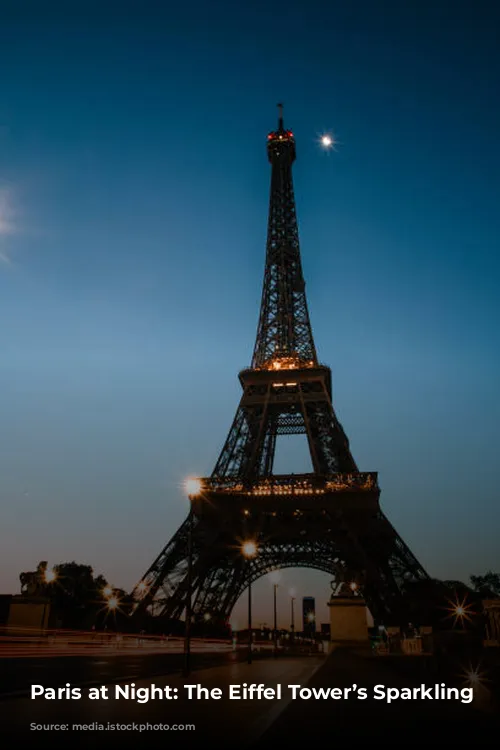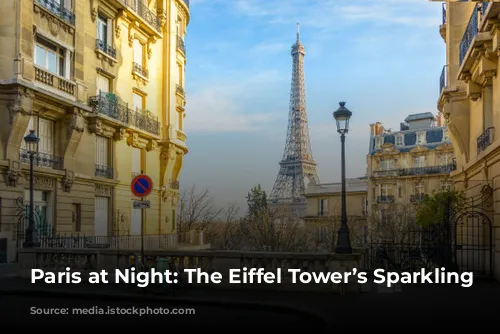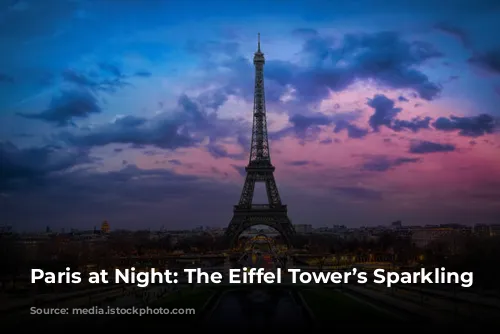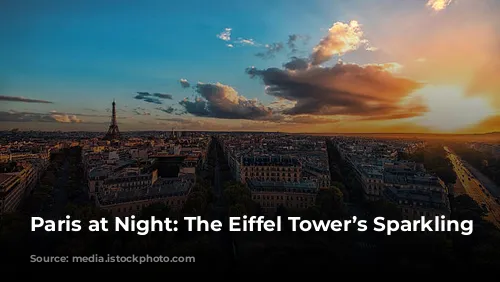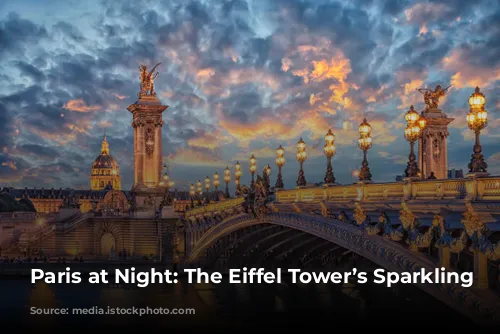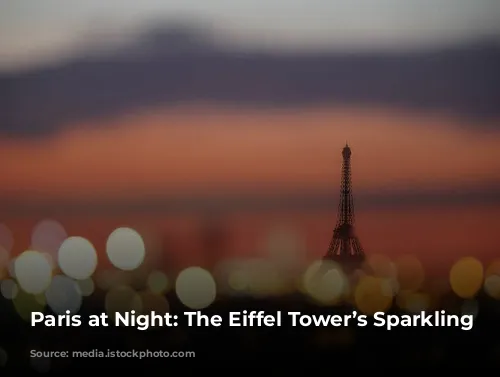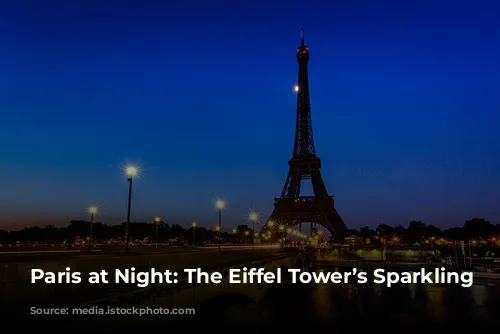Paris, the City of Lights, is even more dazzling after dark. Its historic landmarks, including the iconic Eiffel Tower, come alive with a captivating glow. But it’s the Eiffel Tower, in particular, that steals the show, captivating hearts and imaginations with its mesmerizing sparkle. Let’s delve into the secrets behind this breathtaking nighttime spectacle.
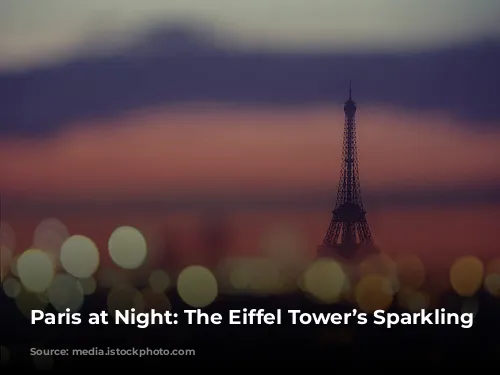
The Iron Lady’s Gleaming Aura
Since its debut at the 1889 World’s Fair, the Eiffel Tower has always been a beacon of light. Even today, its nocturnal radiance is breathtaking. But how did this dazzling display evolve?
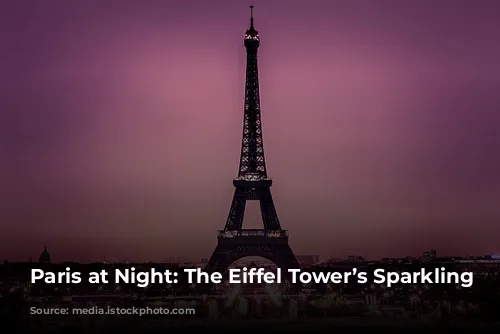
From Gas to Glimmer: A History of Illumination
The tower’s initial illumination came from external gas-powered projectors. On its grand opening, over 10,000 gas burners illuminated the Iron Lady, casting a warm glow across the Parisian skyline.
A decade later, electricity replaced gas, and over 5,000 light bulbs were integrated into the tower’s structure itself. This change not only made the tower more accessible at night but also showcased its elegant design.
In 1985, a major restoration of the Eiffel Tower included a dramatic makeover of its lighting scheme. The iconic “golden dress” was born, symbolizing the tower’s enduring brilliance.
Then, in 2000, the tower’s new beacon and its sparkling display were unveiled, transforming the nightly experience for visitors. This temporary project became a permanent fixture, adding a touch of magic to the Parisian nightscape.
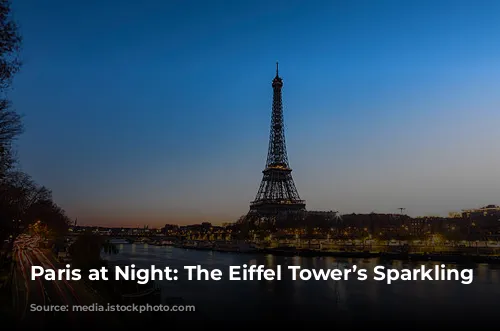
The Eiffel Tower’s Time-Sensitive Sparkle
Every evening, as darkness descends, the tower’s golden glow awakens, guided by light sensors. For 5 minutes at the top of every hour, the Eiffel Tower bursts into a dazzling display of sparkles, transforming the night sky into a symphony of light.
If the sun sets at 8:20 pm, the tower will illuminate in its beautiful yellow hue within the next 10 minutes, and its first sparkle will occur at 9:00 pm.
The tower’s lighthouse also ignites at nightfall, rotating simultaneously with the lighting display.
In line with Paris’s energy-saving initiatives, all the Eiffel Tower’s lights turn off at 11:45 pm. The last flicker of the night occurs at 11:00 pm.
During the summer months, the Eiffel Tower stays open until 12:45 am. The lighting and lighthouse switch off at 1:00 am, and the final sparkle lingers for 5 minutes, a solitary beacon in the quiet night.
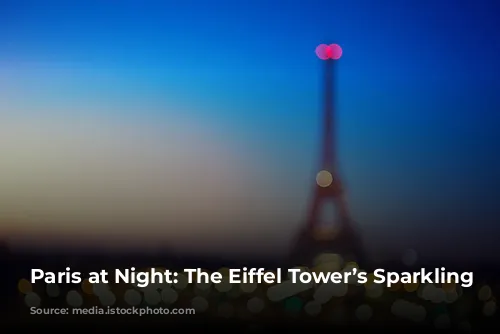
A Sustainable Shine: Balancing Beauty and Efficiency
For years, the Eiffel Tower’s energy consumption has been a significant concern. In 2004, the tower reduced the power of its 336 projectors by 40%, saving 4% of its total energy consumption.
In 2008, the duration of the tower’s sparkle was reduced from 10 to 5 minutes to further minimize its environmental impact.
Despite its dazzling spectacle, the energy consumption of the tower’s 20,000 xenon bulbs remains remarkably low, accounting for only 0.4% of the tower’s total energy costs.
The implementation of the city’s energy-saving plan has further reduced energy consumption, with nighttime flickering now ending at 11:00 pm.
Since 2016, the Eiffel Tower’s lighting has continuously improved its energy performance, achieving an average annual reduction of 9% in energy consumption.
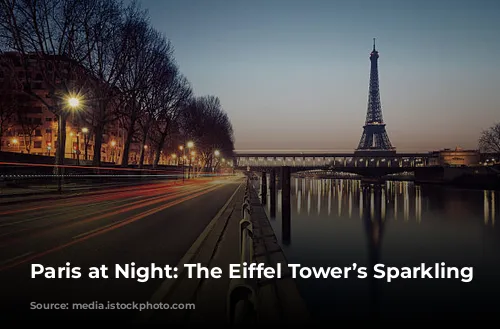
The Eiffel Tower’s Guiding Light: A Historical Beacon
Since its inaugural year, the Eiffel Tower has been equipped with a lighthouse at its peak, initially designed to illuminate major Parisian landmarks like the Arc de Triomphe, Opéra Garnier, and the Louvre Museum.
In 1947, the lighthouse’s beams were utilized for air navigation, serving as a guiding beacon for aircraft. Today, the Eiffel Tower’s lighthouse remains a universal symbol of Paris and its enduring legacy.
The current lighthouse, installed in 2000, comprises two electrical harnesses, boasting a range of 80 kilometers, illuminating the Parisian night with its powerful beam.
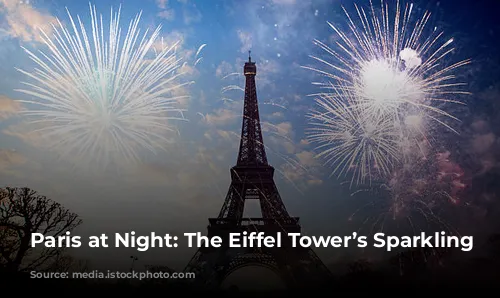
Unforgettable Evenings: A Nighttime Escape
Throughout the year, the Eiffel Tower offers nighttime access, inviting visitors to experience a unique perspective of Paris. The tower’s golden glow transforms the evening into a magical escape.
During a nighttime visit, you can explore the tower as you would during the day, although climbing the stairs is recommended for an unparalleled, intimate experience.
As the sun sets, venture to the top floor and indulge in a glass of champagne at the tower’s champagne bar, enjoying breathtaking panoramic views.
For a romantic dinner with a Parisian backdrop, reserve a table at Madame Brasserie on the 1st floor or at the Michelin-starred restaurant Jules Verne on the 2nd floor.
To fully immerse yourself in the tower’s sparkle, arrive early after dark to witness the mesmerizing spectacle from the heart of the display – the 2nd floor. Golden lights will envelop you, and looking upwards, you’ll be captivated by the tower’s glittering spire.
For stunning views of Paris or to witness the lighthouse in action, ascend to the top of the tower, a truly memorable experience.
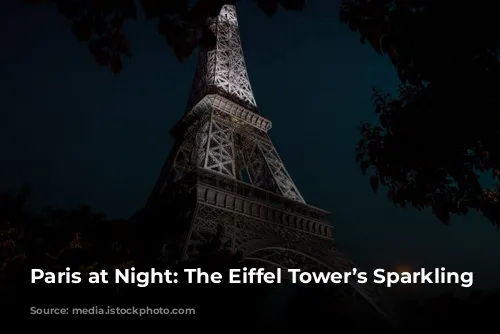
Immortalizing Memories: Capturing the Eiffel Tower’s Nighttime Magic
Capture the magic of the Eiffel Tower’s golden light by taking photographs or videos of this breathtaking spectacle. Share your memories with the world on social media, allowing others to experience the wonder of the Eiffel Tower at night.
However, for professional purposes, the tower’s golden lighting and sparkle are protected by copyright. To use the image of the tower, you will need to obtain authorization from the Société d’Exploitation de la Tour Eiffel.
Visiting the Eiffel Tower during the day or at night presents entirely different experiences. At nightfall, the monument’s golden glow transforms the visit into a magical and unforgettable adventure.
Discover the enchanting history of the Eiffel Tower.
